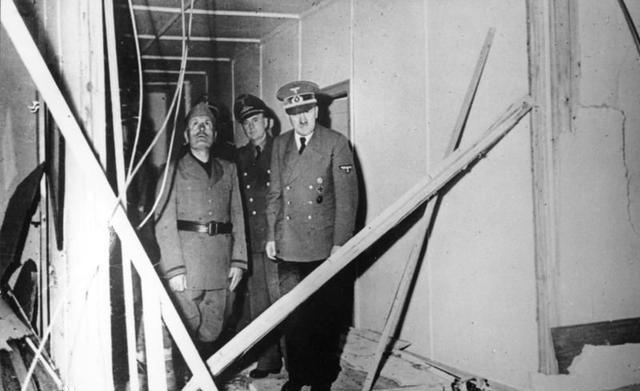Although many of the Germans' actions in World War II were inhumane and disgraceful, some of the generals in the German army were indeed very good. I am particularly fond of Marshal Rommel and lament that he was eventually forced to die by Hitler. According to history, although Rommel was not directly involved in the "Valkyrie" plan to assassinate Hitler, he did not report it. But the assassination plan seems seamless, and one can't help but wonder what the world will look like next if the assassination is successful.

By early 1944, the situation on the Eastern Front had taken a sharp turn for the worse, with the Soviets invading Poland and forcibly crossing the Nimen River to germany proper. The Allies also successfully landed in Normandy, and the Germans suffered frequent defeats on both fronts, and at this time, some people in the German hierarchy believed that it was Hitler's disastrous offensive strategy and wrong command that brought Germany into the current situation, which would eventually lead Germany to lose the war. As a result, an organization of officers aimed at assassinating Hitler and eliminating his supporters came into being, and in June of that year, a rigorous "Valkyrie" plan was drawn up.
The plan not only included how to systematically eliminate Hitler and his henchmen, but also made arrangements for how to control the army and establish a new government after the assassination was completed. Once the plan was successful, Germany would make peace with the Soviet Union and the Allies, thus avoiding a complete defeat in the war. However, after two failed assassinations, Hitler began a large-scale purge of the German army, and nearly 5,000 officers at all levels, including Marshal Rommel and Marshal Kruger, were executed, and even some unsuspecting people were also implicated.
However, if Hitler had been assassinated in the planned way, it would have been quite possible that Germany would have surrendered in July 1944, in accordance with the wishes of the officers of the assassination order. The likelihood of a German armistice was not insignificant, and if the officers of the Assassination Order did not ultimately gain leadership of Germany, Hitler's successor would have been none other than Air Marshal Goering, Nazi Propaganda Minister Goebbels, and SS Captain Himmler. Goering's lack of talent and mediocre talent were well known within the German Army, which indirectly prevented the Germans from taking Britain because of his strong opposition to Dönitz's proposal to form a powerful navy early in the war. As a result, Goering could not convince the public and it was difficult to succeed him steadily as The Fuehrer of Germany. Although Goebbels had a talent for speech and was not low in popularity in Germany, his political talent was average. Himmler had a greater power advantage in the SS, and in fact, Himmler had a strong armistice tendency, so if Hitler was successfully assassinated, Germany would inevitably withdraw from World War II early.
At this time, although the Allies successfully landed in Normandy, they still fought hand-to-hand with the Germans on the coastline and the seine-Marne River. In order to reduce casualties and war losses, Britain, France and other countries are likely to agree to accept Germany's surrender, while also extracting as much benefit as possible from Germany's territory. Desperate to avoid a final defeat, Germany would meet the Allied demands as much as possible in exchange for an armistice.
At this time, the Soviet Union was different, after a long period of resistance, with the tradition of "revenge" of the Soviet leadership, the Soviet Union would certainly not accept Germany's surrender when the situation was fully dominant. Stalin would still order the Red Army to continue its offensive against Berlin. At this time, the US military was still caught in the Pacific War with Japan, although after the Battle of Midway, the US army had successfully turned the situation around, but the surrender of Germany must have made the Americans think that the consumption with Japan in the Pacific was a senseless loss. At this point, the United States will certainly increase its dependence on the Soviet Union, and the Soviet Union will gain more in dividing up the spoils of War in Europe. In this way, after the end of World War II, the power map of world capitalism and socialism will be greatly different, which will affect the situation and even the outcome of the subsequent Cold War.
In this way, the results described above are very much like the traditional methods of dividing the world among the Western powers, including the First World War, so that no one can guarantee that the eradication of Nazism from Germany means that the world will always be at peace. Once Germany's national sentiment is once again stirred up and conflicts with Britain and France are resumed for the benefit of the great powers, a new round of world war may be launched at any time.
Of course, history cannot be rewritten, and everything was saved by the accidental move of the briefcase containing the time bomb to the other side of the desk, and also determined the history of World War II that we see today.